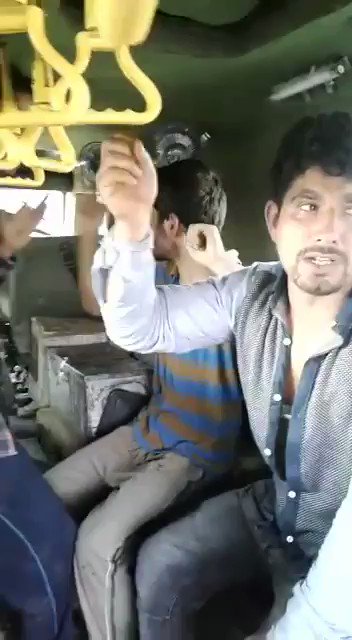SOURCE:
http://www.defencenews.in/article.aspx?id=251603
VIEW FROM FROM PAKISTAN
"STATEMENT OF COMPLAIN IN FIR"
MADE IN PAKISTAN

Feature image source: Video Screenshot
VIEW FROM FROM PAKISTAN
LODGE
A "FIR"
AGAINST INDIAN ARMY
- Gen DigVictory Singh
- Gen DigVictory Singh
"STATEMENT OF COMPLAIN IN FIR"
Indian Army Kills 8 Pakistani Soldiers as forces retaliate to ceasefire violation along LoC in Rajouri
Eight Pakistan Army soldier were killed and several injured as Indian Army retaliated to unprovoked ceasefire violation along the Line of Control (LoC) in Rajouri district of Jammu and Kashmir today.
Pakistan Army started heavy mortar shelling and firing at two Indian positions in Jhanger and Sher Makedi village near the LoC in Naushera, triggering of a gun duel, a defence official said.
"Pakistan Army initiated indiscriminate firing of small arms, automatics and mortars on Indian posts on the LoC in two villages of Naushera sector in Rajouri district at around 8 am. Indian Army posts are retaliating strongly and effectively," said Defence Ministry spokesman, Lt Col Manish Mehta.
According to the defence sources, mortar shell fired by the Indian Army fell into an Army camp across the border and Pakistan suffered maximum causality.
Pakistani helicopters and ambulances were seen from across the border to shift the injured and dead Pakistan Army soldiers to near by hospitals.
These areas normally remain calm but Pakistan is now using soft areas for infiltration of armed terrorists from old routes. The Pakistan Army is giving cover fire to terrorists so that they can infiltrate to kick-up violence in the border districts of Rajouri and Poonch, defence officials said.
Intelligence agencies have already alerted the Army and the state police that this summer will be hot and more than 100 terrorists are waiting on launching pads near Line of Control to cross over to the Indian side.
Pakistan Army started heavy mortar shelling and firing at two Indian positions in Jhanger and Sher Makedi village near the LoC in Naushera, triggering of a gun duel, a defence official said.
"Pakistan Army initiated indiscriminate firing of small arms, automatics and mortars on Indian posts on the LoC in two villages of Naushera sector in Rajouri district at around 8 am. Indian Army posts are retaliating strongly and effectively," said Defence Ministry spokesman, Lt Col Manish Mehta.
According to the defence sources, mortar shell fired by the Indian Army fell into an Army camp across the border and Pakistan suffered maximum causality.
Pakistani helicopters and ambulances were seen from across the border to shift the injured and dead Pakistan Army soldiers to near by hospitals.
These areas normally remain calm but Pakistan is now using soft areas for infiltration of armed terrorists from old routes. The Pakistan Army is giving cover fire to terrorists so that they can infiltrate to kick-up violence in the border districts of Rajouri and Poonch, defence officials said.
Intelligence agencies have already alerted the Army and the state police that this summer will be hot and more than 100 terrorists are waiting on launching pads near Line of Control to cross over to the Indian side.
MADE IN PAKISTAN

MADE IN PAKISTAN
ABP News showing videos showing our army soldiers beating Kashmiri youth actually shot in Pakistan. New high by ISPR.
Two videos, purportedly showing army soldiers beating youths and forcing them to chant anti- Pakistan slogans, are doing rounds on the social media, amid allegations of human rights violation by the security forces in Kashmir.
In one of the videos, a student of Pulwama Degree College is purportedly seen pinned to the ground by four army personnel and being thrashed with a cane.
In the second video, three youths are purportedly seen in an army vehicle and being forced by a soldier to abuse Pakistan and chant slogan "Pakistan murdabad". "Azaadi chahiyay tumko? (Do you want freedom?)" the soldier is seen asking the youths before slapping them and hitting them with a stick. One of the youths in the army vehicle seems to be injured as blood is seen oozing from his forehead in the video.
It is not yet clear who shot the videos but they are being circulated across the social media platforms, leading to condemnation from the netizens of Kashmir.
Yesterday, a video went viral on social media in which a youth was seen allegedly tied to an army jeep as a human shield against stone pelting and paraded through several villages in Budgam district.
The video drew widespread condemnation, with former chief minister Omar Abdullah terming it as "shocking" and prompting Chief Minister Mehbooba Mufti to seek a detailed report from the state police.
Army also began an internal investigation into the incident. No army or defence officials were available for a comment on today's videos.






